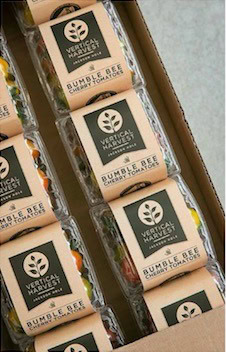WRITTEN BY Bek Mitchell-Kidd
PHOTOGRAPHY PROVIDED BY Vertical Harvest
At an altitude of over 6,000 feet, a Jackson Hole winter can last until May, making the produce-growing season only a few months long. This shortened season creates the need for hundreds of thousands of pounds of food to be trucked into the area each year.
Enter Vertical Harvest co-founders Penny McBride and Nona Yehia, who spent more than six years working with industry experts and local community leaders to develop a model that creates a sustainable source of locally grown, fresh vegetables…year round. A tall order, and one that the partners delivered on in a three-story high farm.
![]()
As one of the world’s first vertical hydroponic greenhouses—built on a sliver of vacant land next to a parking garage—it’s 13,500 square feet and utilizes a one-tenth of an acre infill lot to grow an annual amount of produce equivalent to five acres of traditional agriculture.
Hydroponic farming is a highly productive, environmentally friendly and space-efficient way to farm. The method involves growing plants using mineral nutrient solutions delivered in irrigated water, eliminating the need for soil. The water is recirculated, using 90 percent less water than traditional farming. Hydroponic farming allows control over plant nutrition for optimal flavor and quality, and some hydroponic crops grow at twice the pace of their soil-based peers, making it an ideal alternative farming option for Jackson Hole’s climate.
Vertical Harvest’s produce does not compete with traditional area growers but instead tries to reduce the amount of imported produce and related transportation charges to local businesses from large-scale distributors suppling Wyoming from distant states. The organization’s specially designed recirculating hydroponic methods save land and water, eliminate agricultural runoff and chemical pesticides, and offer the benefits of efficient, high-yield, local, year-round food production…and some pretty tasty leafy greens.
Sam Bartels, Business Development Director, says, “We currently deliver produce twice weekly to several local restaurants and grocery stores. When we reach capacity we will be producing 100,000 pounds of produce per year.” There’s also a public retail space, “Market,” which sells the farm’s produce—including tomatoes, microgreens and lettuce to locals and visitors.
![]()
“Unexpected challenges are the nature of all farming,” explains Sam, “and whenever you have a business rooted in something that is living you can always expect the unexpected—hydroponics is no exception. We may have a different list of challenges, but they are farming challenges all the same. With this being said, our farm is incredibly unique.”
Vertical Harvest is more than just a farm. CEO Nona says they are starting to see an impact on social innovation too, stating, “In just a year, it’s been astounding to witness how Vertical Harvest has impacted our community and inspired others. The pairing of world-first innovation with an underserved population is what is important, that people with different abilities deserve not just employment, but meaningful employment. Our public tours allow members of the Jackson community and visitors to see our model working firsthand. Learning about sustainable agriculture and hydroponic farming from an adult with different abilities challenges some pre-conceived notions of what this population is capable of.”
Nona is referring to Vertical Harvest’s “Innovative Employment” model. The farm provides meaningful employment and a fully-integrated workplace for local Wyoming residents with different abilities. The program identifies the strengths, conditions and interests of a job candidate to discover the unique talents of people with intellectual and physical disabilities.
Caroline Croft Estay, Director of Human Resources, says, “My vision is that integrated employment becomes a natural part of a business structure throughout our country. I believe employment in the disability world is the next Civil Rights movement. Since there are more people diagnosed each year with varying degrees of disabilities, we need to look at the holistic picture. Meaningful and competitive employment is the future.”
![]()
Sprout Academy is an education and community engagement program launched this summer that focuses on kids. The living classroom tells the story of food, from farm to plate, and how plants are integral to leading a healthy lifestyle. The hands-on curriculum encourages independent thinking as students learn about hydroponic farming, nutrition, plant biology and the connection between food and community.

Education Coordinator Joelle Lazzareschi says, “We are so thrilled with the success of the Sprout Academy pilot program. It allowed us to see that interest in these types of programs is strong throughout the Jackson community, and we hope to be able to fund an expansion of our education programs going forward.”
It’s not just the Jackson Hole community that’s paying attention. “When people enter our doors,” says Caroline, “they are in awe of every aspect of our operation, from the innovative hydroponic growing systems to our unique glass building structure and our integrated employment model. We are currently talking about replication with several entities in the US. Our business mission and social mission are equal, and we could not have one without the other.”
Vertical Harvest’s team agrees. As one employee, Nikki, explains, “My job as the Market Assistant Manager consists of many things! Between greeting customers and checking them out at the register, stocking and quality controlling the produce, receiving other products that are not produce, cleaning, and making schedules, I am a very busy person at Vertical Harvest/Market, but I wouldn’t trade it for the world!”
![]()
